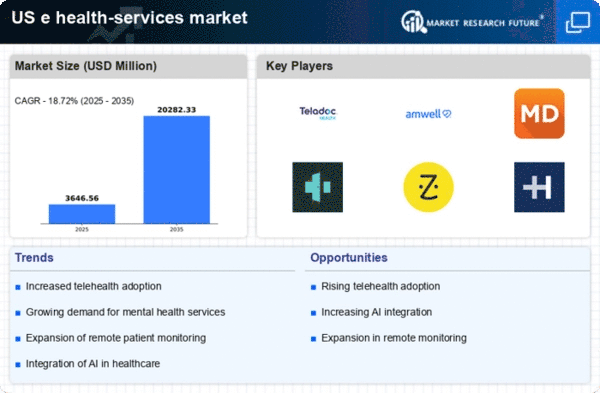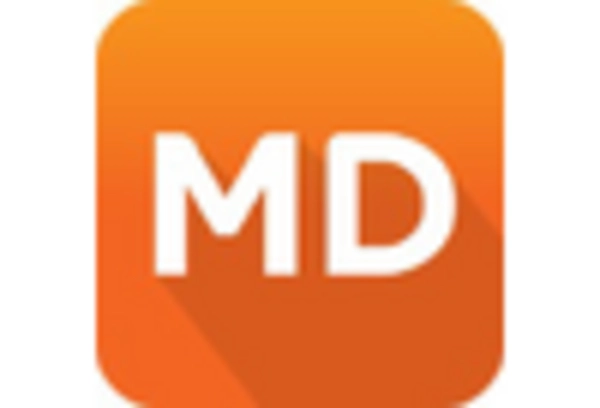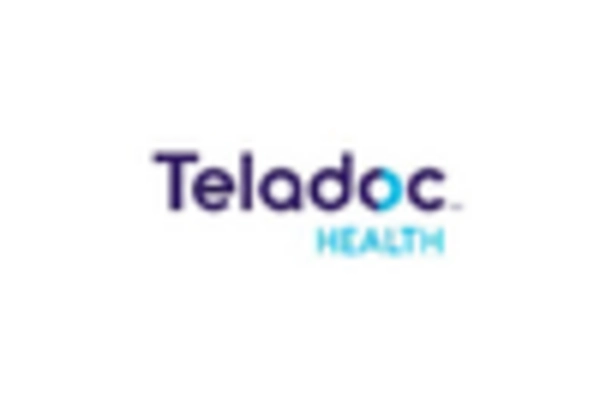Increased Focus on Preventive Healthcare
The e health-services market is witnessing an increased focus on preventive healthcare, which is reshaping the landscape of health services. This shift is largely driven by a growing awareness of the importance of early intervention and lifestyle management in preventing chronic diseases. The e health-services market is responding by offering a range of digital tools and resources that empower individuals to take charge of their health. For instance, wellness apps and online health assessments are becoming more prevalent, enabling users to monitor their health metrics and receive personalized recommendations. This proactive approach not only enhances individual health outcomes but also reduces the overall burden on the healthcare system. As preventive healthcare continues to gain traction, the e health-services market is likely to expand its offerings to meet the evolving needs of consumers.
Rising Demand for Remote Healthcare Solutions
The e health-services market is experiencing a notable surge in demand for remote healthcare solutions. This trend is driven by an increasing number of patients seeking convenient access to medical services without the need for physical visits. According to recent data, approximately 70% of patients in the US express a preference for telehealth options, indicating a shift in consumer behavior. The e health-services market is adapting to this demand by expanding its offerings, which include virtual consultations, remote monitoring, and digital health platforms. This shift not only enhances patient satisfaction but also alleviates pressure on traditional healthcare facilities, allowing them to focus on critical cases. As the population ages and chronic diseases become more prevalent, the demand for remote healthcare solutions is likely to continue its upward trajectory, further solidifying the e health-services market's role in the healthcare ecosystem.
Growing Investment in Health IT Infrastructure
Investment in health IT infrastructure is a significant driver of the e health-services market. As healthcare organizations recognize the need for robust digital solutions, funding for health IT initiatives is on the rise. Recent reports indicate that spending on health IT is projected to reach $250 billion by 2026, reflecting a strong commitment to enhancing digital capabilities. This influx of capital is enabling the e health-services market to develop and implement advanced technologies, such as electronic health records (EHRs) and interoperable systems. These technologies facilitate better data sharing and communication among healthcare providers, ultimately leading to improved patient care. As investment in health IT infrastructure continues to grow, it is expected that the e health-services market will become increasingly integrated into the broader healthcare landscape, driving innovation and efficiency.
Regulatory Support for Digital Health Initiatives
Regulatory support is emerging as a crucial driver for the e health-services market. The US government has implemented various policies aimed at promoting digital health initiatives, which are designed to enhance access to healthcare services. For example, recent legislation has expanded reimbursement for telehealth services, making it financially viable for providers to offer these services. This regulatory environment encourages innovation and investment in the e health-services market, as stakeholders seek to capitalize on new opportunities. Additionally, the establishment of clear guidelines for data privacy and security fosters trust among consumers, further driving adoption. As regulatory frameworks continue to evolve, they are likely to create a more conducive environment for the growth of the e health-services market, ultimately benefiting both providers and patients.
Technological Advancements in Healthcare Delivery
Technological advancements are playing a pivotal role in shaping the e health-services market. Innovations such as mobile health applications, wearable devices, and telemedicine platforms are revolutionizing how healthcare is delivered. The integration of these technologies enables healthcare providers to offer more efficient and personalized care. For instance, the use of wearable devices has increased by over 50% in the last few years, allowing for real-time health monitoring and data collection. This data is invaluable for healthcare professionals in making informed decisions. Furthermore, the e health-services market is witnessing a rise in the adoption of cloud-based solutions, which facilitate seamless communication between patients and providers. As technology continues to evolve, it is expected that the e health-services market will further enhance its capabilities, leading to improved patient outcomes and operational efficiencies.

















